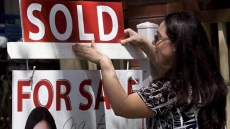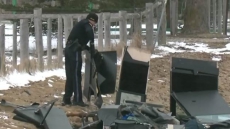TORONTO — Alyssa Hanson thought she had done her due diligence on the home inspection front.
Hanson brought in three professionals — a home inspector, a septic tank inspector and a specialist to take a look at the fireplace and the wood stove — before she and her family purchased their dream home, a 2,000 square foot house with a view of the Rideau River in the southern part of Ottawa.
A month after they had moved in, water started seeping into the basement.
Hanson says at least six contractors have come by to survey the damage.
"Every single one of them said, 'How did your house inspector not catch the fact that there is water in the basement?'" Hanson recalled in an interview.
"Obviously the house inspector can't open up a wall and look, but there is a spot where it was unfinished, and it was very obvious to everyone that came in that there was water coming in, in that unfinished area."
Rusted support beams and rotting carpet tacking should have made it evident that the problem had existed for years, says Hanson.
The leaky foundation will cost Hanson $12,000 to repair — a hefty price tag after pouring all of her savings into the downpayment.
Consumers rely on home inspectors to help them vet what is often the largest purchase and investment of their lives. If an inspector fails to spot an issue, that can leave the homeowner on the hook for thousands of dollars' worth of unexpected costs.
Yet in most Canadian provinces and territories, including Ontario, anyone can call themselves a home inspector — regardless of whether or not they have completed any sort of professional training.
That may soon change in Ontario, anyway. The provincial government says it plans to introduce legislation aimed at regulating the home inspection industry sometime this year.

Ontario first started discussing plans to license home inspectors back in 2013, when it assembled a panel of industry experts to draft a report on the topic.
The panel made a number of recommendations, including that inspectors be required to pass a written exam and a field test in order to become licensed. The panel also recommended having a single, clearly defined standard for all home inspections.
"There is a very significant risk that a consumer can hire a home inspector who does not have adequate education, training or experience to do the job properly," says Graham Clarke, a member of the panel and the president of the Canadian Association of Home and Property Inspectors.
"In the absence of any regulation, anybody can sound like they are eminently qualified to do the job, and they very often aren't."
Currently, the only provinces that regulate home inspectors are British Columbia and Alberta, although both are contemplating changes to their regimes.
The B.C. government says it plans to introduce a more rigorous licensing system for inspectors in 2017, as well as implementing a standard of practice that all inspections must adhere to.
Under the current regime, home inspectors can obtain a license by becoming accredited through one of several industry associations, and the educational standards they must meet to obtain that accreditation can vary from one association to the next.
"The certification requirements are pretty wide and variable," says Claude Lawrenson, president and chair of the National Home Inspector Certification Council.
The inspection itself can also vary — from what aspects of the home are included to what methods the inspector uses to examine them.

Last month the CSA Group, a Canadian not-for-profit standards organization, published Canada's first national standard on how home inspections should be conducted.
Ontario, Alberta and B.C. all helped fund the creation of the standard. The three provinces say they are currently in the process of reviewing the document and deciding whether or not to incorporate it into their regulations.



